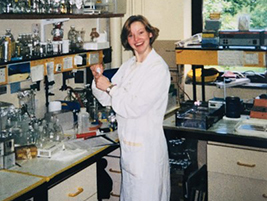I am honoured and delighted to receive a Daphne Jackson Fellowship hosted by the Elizabeth Blackwell Institute. I visited the Daphne Jackson Trust stand at the STEM outreach Big Bang festival and realised the part-time programme would be ideally suited to allowing my return to research and allow a flexible work pattern to fit around family commitments.
Confidence boost
Receiving this Fellowship has already boosted my confidence and means so much to me, as I’ve always had a passion for microbiology, research, STEM and science outreach. Although I have been out of academic science for ten years, I previously held two research associate positions and have a strong publication record. The Fellowship will provide a retraining platform and I will upskill in microbial bioinformatics and systematic reviews.
Do our gut bugs hold all the answers?
I will be joining co-supervisors, Principle Investigator, Professor Alastair Hay and Dr Ashley Hammond (Population for Health Science, Bristol Medical School) on the METRIC study (Influence of the human Microbiome in the acquisition of acute Respiratory tract Infections in the Community: a prospective cohort feasibility study). The informal title of my project is: A sore throat and an upset tummy. Do our own bugs hold all the answers? I will investigate how both the gut and respiratory microbiomes differ in healthy adults compared to those that contract seasonal respiratory infection-like symptoms, like a cold.
Reducing antimicrobial resistance
We’ve all experienced the misery of colds, coughs and upset tummies. Respiratory disease costs the NHS about £165 billion per year and a trip to your GP with a simple respiratory infection might result in a course of antibiotics. In fact, most respiratory infections are caused by viruses which means that antibiotics are useless. There is a balance between effective prescription of antibiotics for serious illness and unnecessary over-prescription. Excessive prescriptions are causing bacterial resistance which is a huge global problem. If we could identify and target only those who will benefit most from antibiotics, this would help prevent the development of antibiotic resistance, save the NHS money, improve people’s quality of life and reduce days lost from work.
The gut and respiratory microbiome
We each harbour trillions of bacteria, in every body niche, called microbiomes. Unique microbiomes exist in our intestines and respiratory systems, like a fingerprint profile, made up of bacteria. Respiratory infections are often accompanied by intestinal symptoms such as diarrhoea alongside associated changes in the gut microbiome. Yet very little is known about the link between your gut and respiratory microbiome, especially in acute seasonal respiratory tract infections and whether these bacterial profiles could be used as a prediction susceptibility to illness.
Patterns in the microbiome
I will contribute to this study by using cutting edge microbial bioinformatics (computer-based biological data analysis) to profile bacterial species identified in hundreds of stool and saliva samples, collected from volunteers (these samples represent the gut and respiratory microbiomes). We will track microbial changes in the gut and respiratory microbiomes when an individual becomes infected with a respiratory tract infection. In the hope that specific patterns in the microbiome can be used to predict which individuals are more susceptible to respiratory tract infections.
We predict this study will start to unravel the complex relationship between the gut and respiratory microbiomes as very little is known about this link especially in acute seasonal respiratory tract infections, with the aim of providing a novel way to identify vulnerable people in the community. The ultimate prize being a reduction in respiratory infections and antibiotic prescriptions.
The study already has around 50 people enrolled so far, and we would like more volunteers! If you would like to know more, or find out how to get involved please email metric-study@bristol.ac.uk

